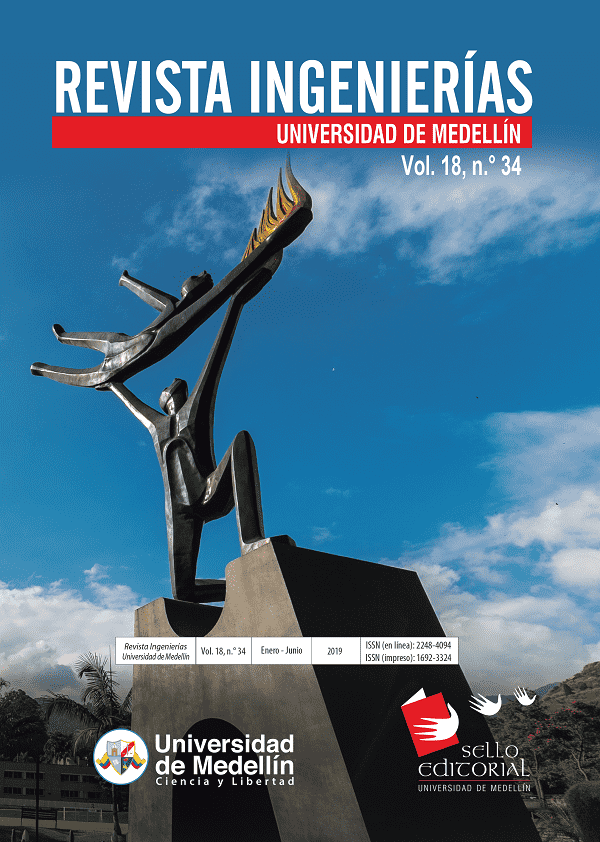Prototype design and implementing of a three-finger adaptive robotic gripper based on the FinRay® structure
Copyright (c) 2023 Revista Ingenierías Universidad de Medellín

This work is licensed under a Creative Commons Attribution-NonCommercial-NoDerivatives 4.0 International License.
- Articles
- Submitted: October 23, 2017
-
Published: June 28, 2019
Abstract
Given the accelerated advancements in microelectronics and processing systems, robotics are constantly going forward in new areas alongside the industries. Some robotic handlers require being able to maneuver with objects with different dimensions, surfaces, and delicate textures, which sets the need for new final effectors with new mechanics and control features. Likewise, with the ongoing research developed in the bio-mimesis area, a very reliable and viable for replicating nature principles for the development of technological appliances. This document describes the mechanical design and the physical implementing process of an adaptive robotic gripper with jaws based on the FinRay® structure regarding the movement reaction of a fish fins. The achieved results show its effectivity and adaptability for the gripping of different objects.
References
[1] J. Hemming, et al., “A robot for harvesting sweet-pepper in greenhouses”. International Conference of Agricultural Engineering, Zúrich, 2014.
[2] W.Crooks, G. Vukasin, M. O’Sullivan, W. Messner, C. Rogers. “Fin Ray® Effect Inspired Soft Robotic Gripper: From the RoboSoft Grand Challenge toward Optimization” Frontiers in Robotics and AI, vol 3, pp. 70, 2016. DOI: 10.3389/frobt.2016.00070
[3] A. Zapciu, G. Constantin, D. Popescu, “Adaptive robotic end-effector with embedded 3Dprinted sensing circuits”, MATEC Web of Conferences, vol. 121, 2017.
[4] J. C. Yeo, H. K. Yap, W. Xi, Z. Wang , C.-H. Yeow, C. T. Lim. “Flexible and Stretchable Strain Sensing Actuator for Wearable Soft Robotic Applications”. Advanced Materials Technologies, vol 1, n.° 3, pp. 1600018-1600026, May 2016.
[5] R. D. Howe, A. M. Dollar, M. Claffee, “Robots get a Grip”, IEEE Spectrum, pp. 42-47, Dec. 2014.
[6] E. Brown, et al., “Universal robotic gripper based on the jamming of granular material”, PNAS, vol 107, n.° 44, pp 18809-18814, 2010.
[7] B. Homberg, R. Katzschmann, M.R. Dogar, D. Rus, “Haptic identification of objects using a modular soft robotic gripper”, IEEE/RSJ International Conference, Hamburg, Germany, 2015.
[8] W. Crooks, S., Rozen-Levy, B. Trimmer, C. Rogers, W. Messner, “Passive gripper inspired by Manduca sexta and the Fin Ray® Effect.”, International Journal of Advanced Robotic Systems, vol 14, n.° 4, 2016.
[9] Y. Bar-Cohen, “Biomimetics: Nature-Based Innovation”, Boca Ratón: CRC, 2016.
[10] O. Pfaff, S. Simeonov, I. Cirovic, P. Stano. “Application of FinRay® Effect approach for production process automation”, DAAAM International, vol 22, n.° 1, pp. 1247-1248, 2011.
[11] W. Natchigall y N. Wisser, Bionics by Examples: 250 Scenaries from Classical to Modern Times. Alemania: Springer, pp 325, 2015.
[12] A. Barrientos, L. Peñin, C. Balaguer, R. Aracil, Fundamentos de Robótica, España: McGraw Hill, 2007.
[13] R. Miranda, Cinemática y Dinánima de Robots Manipuladores, México: Alfaomega, 2016.
[14] S. Khatib, Handbook of Robotics, Berlín: Springer, 2008.
[15] G. Kragten, Underactuated Hands. Fundamentals, performance analysis and design, Ph. D, Technische Universiteit Delft, 2011.



















